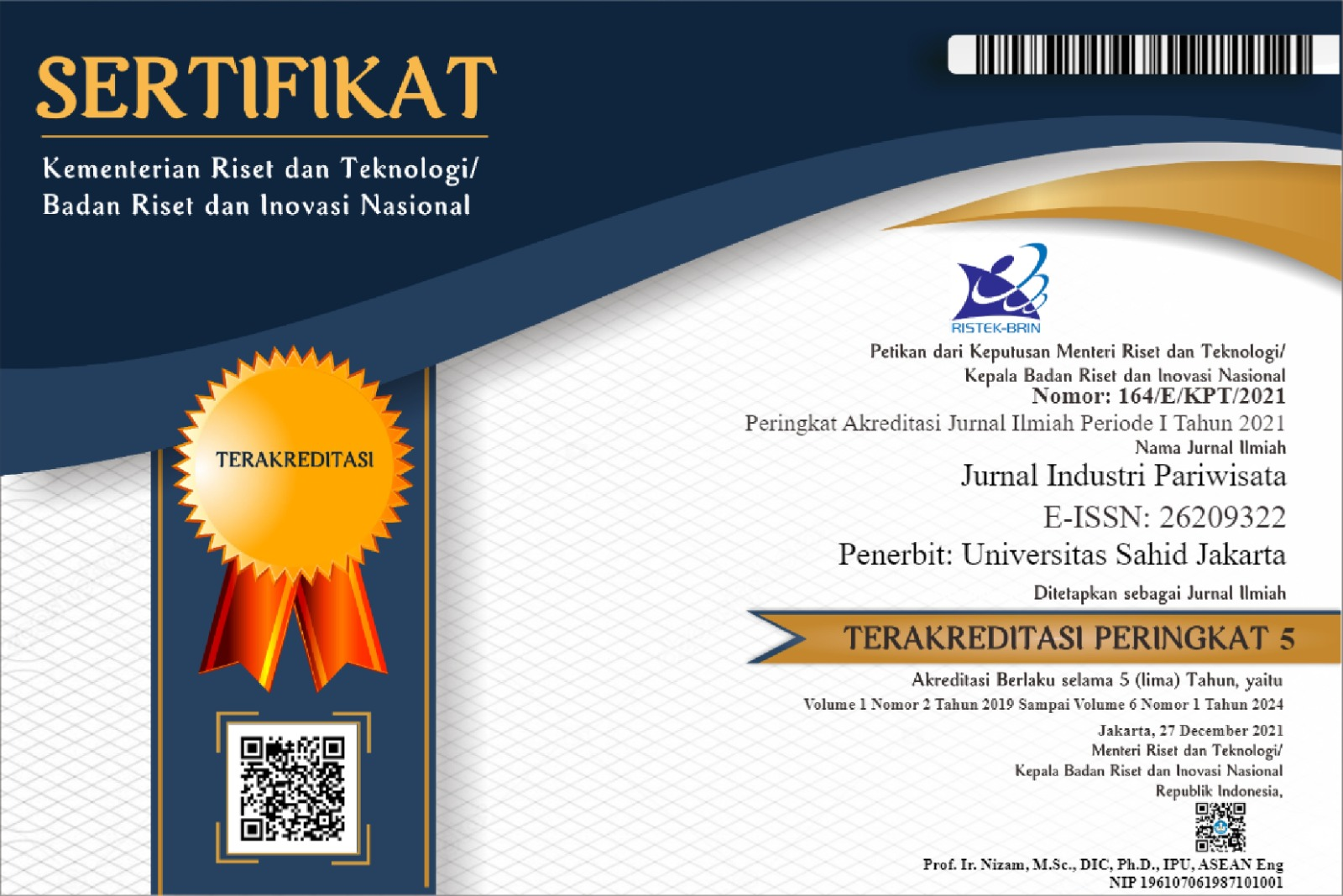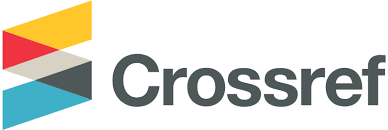Author Guidelines
ARTICLE TITLE (TNR, 14pt, Bold, Center position, Single space)
(Maximum 12 words outside conjunctions)
Author's nameˡ, Author's name², Author's name³ (without title, font size 12pt)
ˡInstitution Name
Address, City (11pt italic font)
²Institution Name
Address, City (11pt italic font)
³Institution Name
Address, City (11pt italic font)
Email Correspondence:
ABSTRAK (Times News Roman, 12pt)
Naskah ditulis dalam format MS Word. Ukuran kertas A4, dengan margin: kiri 3 cm, kanan 3 cm, atas 3 cm dan bawah 3 cm, spasi 1. Abstrak ditulis dalam Bahasa Indonesia, ukuran huruf 11pt, Times News Roman. Abstrak merupakan ringkasan yang meliputi latar belakang, tujuan, metode, hasil dan kesimpulan dalam bentuk singkat dan jelas. Jumlah kata dalam abstrak tidak lebih dari 250 kata.
Kata Kunci: Huruf Times News Roman, Ukuran 10 pt dan tidak lebih dari 5 kata kunci (Sebaiknya kata kunci bukan berasal dari judul)
ABSTRACT (Times News Roman, 12pt, Italic )
Manuscript should be written in MS Word file. Use the A4 paper with the left and top margin 3 cm and 3 cm for right and bottom margin, single space. Abstract should be written in English, font 11pt, Times New Roman, for English typed Italic. Abstract is a summary that includes the background, objectives, methods, results and conclusion in a clear and concise form. Word count for abstract should be no more than 250 words.
Keywords: Font type Times News Roman, size 10pt and number of keywords not more than 5 keywords (We recommend that keywords not come from titles)
INTRODUCTION
The chapter in the introduction contains the background of the problem, identification of problems, the goals to be achieved which discusses the novelty of scientific research from articles, research, and hypotheses (if any) that also supported by a literature review. [Times New Roman, 12pt, normal, justify].
RESEARCH METHODS
This chapter describes the methods used in research, starting from the population, samples, sampling techniques, sources and methods of data collection, operationalization of variables and methods of data analysis. For articles that are not research results, they can contain an explanation of the subject that is the focus of the discussion (for example, the phenomenon of social media in consumer behavior in Indonesia) as well as the proposed steps in solving the problems at hand. [Times New Roman, 12pt, normal, justify].
RESULTS AND DISCUSSION
This chapter contains the results of data analysis in answering research problems or the results of problem solving expected by the author for articles that are not research results. This section explains how these findings were obtained, such as the results of research data analysis, statistical descriptions of the research subjects and objects, testing the research model or proving hypotheses (if any). While the discussion contains explanations that support the results of the research or the results of solving the expected problems. [Times New Roman, 12pt, normal, justify].
CONCLUSIONS
This chapter concludes the article as a whole and the implications of the research or problem solving results. Research implications can be in the form of theoretical implications and managerial implications. Suggestions for future research can be put forward by the authors in this chapter.
ACKNOWLEDGMENTS (if any)
Acknowledgments to the intended parties (if any and significant related to the research). The thank you section (if any) is mainly directed at research funders or donors and those who assist with the implementation of research whose contribution is not significant enough to be included in the authorship group.
REFERENCES
Libraries must be written in the APA Style system. By writing the author's name and year in the text (name, year). Everything listed in the bibliography must be referred to in the text. The following is an example of writing a bibliography in the form of articles in journal publications, books, articles from scientific conferences / proceedings, dissertations / theses / theses and websites.
WRITING FORMAT REFERENCES
Article in Publication Journal
Arbiyah, N., Nurwianti, F., & Oriza, D. (2008). Hubungan bersyukur dengan subjective well being pada penduduk miskin. Jurnal Psikologi Sosial, 14(1), 11-24.
Light, M. A., & Light, I. H. (2008). The geographic expansion of Mexican immigration in the United States and its implications for local law enforcement. Law Enforcement Executive Forum Journal, 8(1), 73-82.
Herbst-Damm, K. L., & Kulik, J. A. (2005). Volunteer support, marital status, and the survival times of terminally ill patients. Health Psychology, 24(1), 225-229. http://dx.doi.org/10.1037/0278-6133.24.2.225
Books
Azwar, S. (2012). Penyusunan skala psikologi (ed.2). Yogyakarta: Pustaka Pelajar.
Articles from scientific conferences / proceedings
Venkatapathy, R. (1992). Entrepreneurial attitude orientation among first and second generation entrepreneurs.Paper presented to the nation workshop on Management Research Development held under the avshpiees of the association of Indian management school, Indira Gandhi Institute for development research.
Dissertation / thesis / thesis
Rimawati, A. B. (2010). Model teoretik prasangka sosial. (Disertasi tidak dipublikasikan). Fakultas Psikologi Universitas Gadjah Mada, Yogyakarta.
Website
Perpustakaan Nasional Republik Indonesia. (2003). Panduan Penulisan Manajemen Ilmiah [Online] (diupdate 16 Jan 2005) Tersedia di: http://www.perpusnas.go.id/we/article [Diakses pada tanggal 10 April 2011].
Other Informations:
In-text citations are written between the opening and closing brackets that state the author's last name, separated by commas, and the page number if deemed necessary.
Example:
- One citation source with one author (Dickson., 2005).
- One citation source with two authors (Antoncic & Hisrich., 2001).
- One source of citations with more than two authors (Case et al., 2004).
- Two sources of citation by different authors (Verheul, Van Stel & hurik 2006; Aaltio et al., 2008; Carrier et al., 2008).
- Two sources of citation by the same author (Miller., 2003., 2008). If the publication year is the same (Darke & Freedman., 1997a., 1997b)
Tables must be numbered and titled according to the order in the text (Table 1. Regression Coefficient) and placed in the center position (centered). The letters in the table title use Times New Roman 11pt with 1 space, Bold, while for sources using 10pt, left aligned. If the table title consists of two lines, use 1 space.
Table 1. Multiple Regression Analysis Results
Model | Unstandardized Coefficient | Standardized Coefficient | t | Sig. |
B | Std. Error | Beta |
Constant | 1,788 | 0,125 | | 14,327 | 0,000 |
Achievement | 0,155 | 0,024 | 0,244 | 6,480 | 0,000 |
Innovation | 0,152 | 0,015 | 0,339 | 10,211 | 0,000 |
Self_esteem | 0,171 | 0,018 | 0,380 | 9,402 | 0,000 |
Internal_loc | 0,194 | 0,020 | 0,294 | 9,700 | 0,000 |
Source: SPSS Processing Results.
- Illustrations and Photos / Images
Photos and pictures must not exceed 30% of the contents of the manuscript and be placed close to the discussion related to and referenced by the image or photograph. All photos and images are numbered in sequence (Figure 1., etc.) and placed in a centered position. Images or illustrations must be clear and easy to read and be provided with sources. The letters in the image title use Times New Roman 11pt with 1 space, Bold while for the source uses 10pt. If the title of the image consists of two lines, use 1 space.

Figure 1.Consumer Behavior Model (11pt)
Source: Kotler & Keller (2006: 174) (10pt)
The numbering of the subtitles does not use numbers or numbers, but uses different letters as in the example below:
RESEARCH METHOD (ALL CAPITAL LETTERS, BOLD, LEFT EDGE AVERAGE)
Population and Research Sample (Small Capital Letters, BOLD, Align Left and Right Edges)
Sampling Method (Lower Capital Letters, Bold Italic, Align Left Edges)












